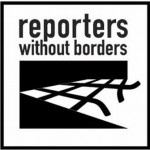Reporters Without Borders is concerned about the government’s plans to tighten control of the Internet in Belarus

 Belarus authorities has threatened to introduce censorship on the Internet about a year before the next presidential election. Under a recently published draft decree “On Measures for Revising Use of the National Segment of the World Wide Web”, websites and Internet users would be strictly controlled by the government and a special unit of the Presidential Administration.
Belarus authorities has threatened to introduce censorship on the Internet about a year before the next presidential election. Under a recently published draft decree “On Measures for Revising Use of the National Segment of the World Wide Web”, websites and Internet users would be strictly controlled by the government and a special unit of the Presidential Administration.
The international press freedom organization Reporters Without Borders has made a statement of protest expressing its concern over the plans of the Belarusian government to tighten control over the Internet:
Government tightens grip on Internet
Published on 6 January 2010Reporters Without Borders is worried about the government’s plans to tighten control of the Internet in a country where free expression is already restricted. President Alexander Lukashenko acknowledged on 30 December that his government is putting the final touches to a bill to this effect. The draft decree was leaked to the media on December 14, 2009. The discussions around it remain secret.
“We must emphasize our concern about this bill, which threatens online free speech and everyone’s right to express their views anonymously without fear of government repression,” Reporters Without Borders said. “After placing most of the traditional media under its control, the regime is pursuing an offensive against new media.”
The press freedom organisation added: “The president’s attempts to be reassuring cannot hide the repressive nature of this bill, which is liable to make netizens censor themselves. It should be abandoned so that Belarus is not added to the list of countries such as North Korea, China and Iran that Reporters Without Borders has identified as Enemies of the Internet.”
The bill would require all online publications to be registered and everyone going online to be identified, both in Internet cafés and at home. Internet café clients would have to show an ID document in order to go online, while Internet Service Providers (ISPs) would have to keep a record of this information and report it to the police, courts and the special agencies that monitor all news content published in Belarus.
Each website would have to register under a procedure to be defined by the cabinet and approved by the presidential office’s Centre for Operations and Analysis, which would be in charge of monitoring site content. If the site has information about Belarus, it would have to be registered under a Belarusian domain name (with the .by suffix).
Finally, ISPs would be forced to block websites deemed by government agencies to be “extremist.” This would be done without referring to any court.
Read the full text at Reporters Without Borders web site.
SB



 The Belarusian opposition seems to be heavily dependent on financing from abroad. During the past 15 years the Belarusian government has cut all the possibilities for it to get sponsors inside the country.
The Belarusian opposition seems to be heavily dependent on financing from abroad. During the past 15 years the Belarusian government has cut all the possibilities for it to get sponsors inside the country.